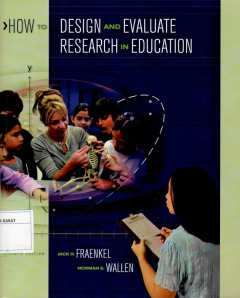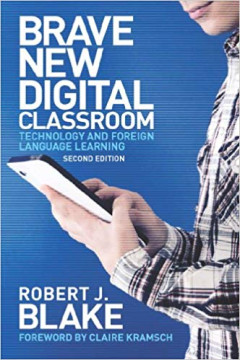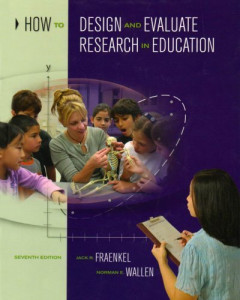Ditapis dengan

Handbook of research on science teaching and learning
A survey of research in science education, compiled by researchers in this field. The handbook explores a wide spectrum of areas crucial to science education. Part I covers science teacher education, instructional strategies and laboratory instruction. Part II examines the epistemological foundations of cognition, alternative concepts in science and the effective dimension of learning. Part III…
- Edisi
- -
- ISBN/ISSN
- 0-02-897005-5
- Deskripsi Fisik
- xvii, 598 hlm. : il., tab. ; 28 cm-
- Judul Seri
- -
- No. Panggil
- R 507.1 GAB h

Research in Education: A Conceptual Introduction (5th Edition)
This pioneering text provides a comprehensive and highly accessible introduction to the principles, concepts, and methods currently used in educational research. A balanced combination of both quantitative and qualitative research, this text also helps students master skills in reading, conducting, and understanding research. The fifth edition also includes techniques for utilizing the resource…
- Edisi
- 5th Ed
- ISBN/ISSN
- 0-321-08087-4
- Deskripsi Fisik
- -
- Judul Seri
- -
- No. Panggil
- 370.7 MCM r

Philosophy Of Educational Research
The training of educational researchers now requires a thorough introduction to philosophical issues. This book synthesizes the relevant areas of philosophy of mind, epistemology, philosophy of social science, ethics, and the philosophy of education. Written in characteristically lucid style, this is the masterwork of a world authority on the subject.
- Edisi
- -
- ISBN/ISSN
- -
- Deskripsi Fisik
- -
- Judul Seri
- -
- No. Panggil
- 300.72 PRI p

Teaching As The Learning Profession : Handbook of Policy and Practice
Leading educational thinkers and researchers deliver an in-depthoverview of the issues and challenges facing the teachingprofession today. This book is the first in over a decade tosynthesize the most important research in the fields of teachingand teacher education. This research is also the basis forrecommAndations found in What Matters Most, a landmarkreport from the National Commission on…
- Edisi
- -
- ISBN/ISSN
- -
- Deskripsi Fisik
- -
- Judul Seri
- -
- No. Panggil
- 371.1 DAR t

How to design and evaluate research in education
How to Design and Evaluate Research in Education provides a comprehensive introduction to educational research. The text covers the most widely used research methodologies and discusses each step in the research process in detail. Step-by-step analysis of real research studies provides students with practical examples of how to prepare their work and read that of others. End-of-chapter problem …
- Edisi
- 7th
- ISBN/ISSN
- 978-0-07-352596-9
- Deskripsi Fisik
- -
- Judul Seri
- -
- No. Panggil
- 370.7 FRA h

Brave New DIgital Classroom Technology And Foreign Language Learning
Brave New Digital Classroom deftly interweaves results of pedagogical research and descriptions of the most successful computer-assisted language learning (CALL) projects to explore how technology can best be employed in the foreign-language curriculum to assist the second language acquisition process. Directed to all language teachersùwhether at the school or the postsecondary level, with or …
- Edisi
- Second Edition
- ISBN/ISSN
- 978-1-58901-976-8
- Deskripsi Fisik
- -
- Judul Seri
- Technology And Foreign Language Learning
- No. Panggil
- 823 BLA b

How to Design and Evaluate Research in Education
How to Design and Evaluate Research in Education provides a comprehensive introduction to educational research. The text covers the most widely used research methodologies and discusses each step in the research process in detail. Step-by-step analysis of real research studies provides students with practical examples of how to prepare their work and read that of others. End-of-chapter problem …
- Edisi
- cet 7
- ISBN/ISSN
- 0078097851
- Deskripsi Fisik
- -
- Judul Seri
- -
- No. Panggil
- 370.7 FRA h
 Karya Umum
Karya Umum  Filsafat
Filsafat  Agama
Agama  Ilmu-ilmu Sosial
Ilmu-ilmu Sosial  Bahasa
Bahasa  Ilmu-ilmu Murni
Ilmu-ilmu Murni  Ilmu-ilmu Terapan
Ilmu-ilmu Terapan  Kesenian, Hiburan, dan Olahraga
Kesenian, Hiburan, dan Olahraga  Kesusastraan
Kesusastraan  Geografi dan Sejarah
Geografi dan Sejarah